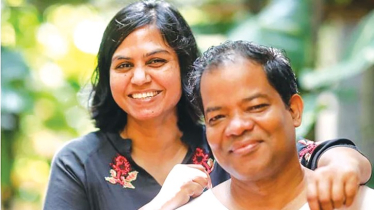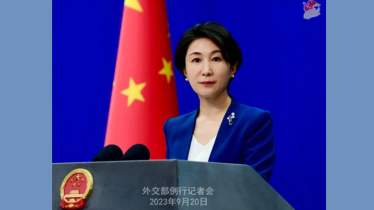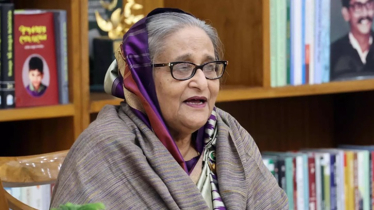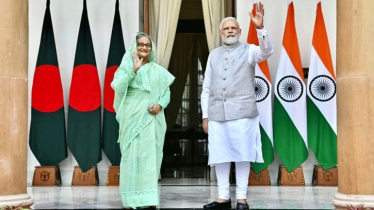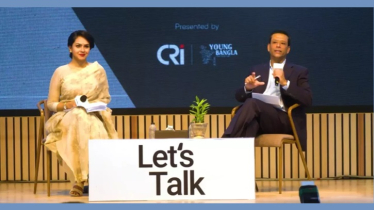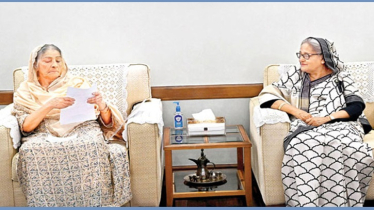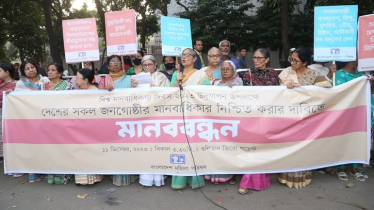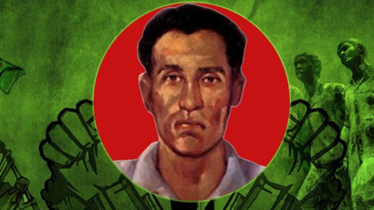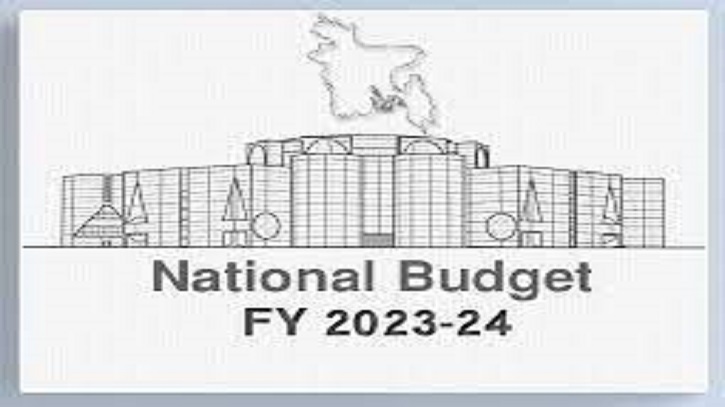
National Budget FY 2023
Finance Minister AHM Mustafa Kamal yesterday placed the proposed national budget for FY2023-24 in Parliament with a deficit of Tk 2,61,785 crore with a focus on making a Smart Bangladesh and annual growth target of 7.5 percent.
In his 252-page budget speech, presented through audio-visual medium, the finance minister hoped to bring down the inflation rate to around 6 percent from the over existing 9 percent, a target economists described as ambitious.
Kamal, presenting his fifth budget in a row, proposed to spend Tk7,61,785 crore, while the total revenue has been estimated at Tk 5 lakh crore – of which 430,000 crore will come through National Board of Revenue and Tk 70,000 crore from other sources.
The proposed size of the budget represents 15.2 percent of the GDP.
While delivering his budget speech yesterday, AHM Mustafa Kamal mainly focused on building 'Smart Bangladesh' announced by Prime Minister Sheikh Hasina.
Vision 'Smart Bangladesh'
The dreams of "Smart Bangladesh" will be realised based on four main pillars: smart citizen, smart government, smart society and smart economy, AHM Mustafa Kamal said in his budget speech.
In Smart Bangladesh, the per capita income will be at least $12,500, less than 3% of people will be below the poverty line and extreme poverty will be reduced to zero, he said.
Inflation will be limited between 4-5%; budget deficit will remain below 5% of GDP; revenue-GDP ratio will be above 20%; investment will be 40% of GDP.
"We will achieve 100% digital economy and science and technology-based literacy. Healthcare will reach everyone's doorstep," said the finance minister.
All the services required by the citizens will be at their door steps, including automatic communication system and sustainable urbanisation.
A paperless and cashless society will be created.
"Most importantly, a society based on justice and equality will be established in Smart Bangladesh," said the minister.
A special allocation of Tk 100 crore has been kept in the next budget for research, innovation and development work to prepare the driving force, the youth and women for building Smart Bangladesh.
In the past decade and a half, under the leadership of Prime Minister Sheikh Hasina, the country has made unprecedented progress in all areas, including economic, social, political, cultural, and scientific and infrastructure, and laid a sustainable foundation for a developed-prosperous-smart Bangladesh by 2041.
"It is on this basis that by 2041 we will have 'Smart Bangladesh' as envisioned by the Honourable prime minister," said the minister in his speech.
Sub head: Govt aims to sustain economic recovery
Finance Minister said the government will focus on sustaining the economic recovery by successfully implementing the ongoing stimulus packages.
"We had adopted 28 stimulus packages worth Tk 2.37679 trillion which was instrumental for a quick economic recovery and helped stabilize the macroeconomic variables through emergency health services, food security as well as by generating employment and reducing economic losses due to Covid," he added.
The government also adopted various strategies such as (1) increasing public expenditure for job creation, (2) providing low-interest loan facilities to industrial and business enterprises through the banking system, (3) expanding the scope of social protection programmes and (4) ensuring optimum money supply while containing inflation at the desired level.
At that time, he said, the government gave much more importance to the protection of people's lives and livelihoods and maintaining macroeconomic stability than growth.
He said the Russia-Ukraine war situation has had the biggest impact on inflation, government spending, balance of payments, foreign exchange reserves and exchange rates.
However, he mentioned, the increase in import costs due to post-war global inflation and the depreciation of the country's foreign exchange rate led to a surge of average inflation to 9.5 per cent in August 2022.
As a result, he said, it will not be possible to keep the annual average inflation within 5.6 per cent as per the target in the current financial year.
Placing yesterday's budget proposal, the minister said that he allocated Tk 4,36,247 crore to operating and other sectors, while Tk 2,63,000 crore to Annual Development Programme (ADP).
The deficit in the proposed budget is estimated at 5.2 percent of GDP, down from 5.5 percent in the outgoing FY2022-23, the finance minister said. The deficit is proposed to be financed from domestic sources of Tk1,55,395 crore, while external sources will bring in Tk1,2490 crore.
The proposed FY2023-24 budget is also the last budget of the current Awami League government before the next general election is held in December this year or in January next year. Keeping the election in mind the finance minister proposed to raise the tax-free individual income tax to Tk3.5 lakh besides withdrawing taxes on several commodities.
Sub head: A closer look into the 52nd national budget
GDP growth forecast 7.5%
Bangladesh's gross domestic product (GDP) growth has been forecast at 7.5% for the Fiscal Year 2023-2024.
Inflation expected to stand around 6%
Inflation will remain much controlled in the next fiscal year and the annual average inflation is expected to stand at around 6%
As per the budget speech, the rate of inflation was 12.3% in FY2007-08. In the 2021-22 fiscal, average inflation was within 6.75%. Even in the last fiscal year, the average inflation was 6.15%.
EC gets Tk2406cr allocation
The Election Commission (EC) has been allocated a budget of Tk2,406 crore for the next fiscal year when it is set to conduct the 12th national election as well as some other polls. The budgetary allocation, however, is 43.86% short of the commission's initial demand.
Tk1,78,241 crore duty rebate
Finance Minister AHM Mustafa Kamal has proposed Tk1,78,241 crore tax rebate for FY 2023-2024.
During his budget speech for FY 2023-24, the finance minister said "Direct Tax Expenditure" means rebates, discounts, exemptions, reduced rates of taxation and exclusion of income from computing total taxable income.
Surcharge-free limit of wealth raised to Tk4cr
The surcharge-free limit of wealth has been raised from Tk3 crore to Tk4 crore in the latest budget for FY2023-24.
Air travel tax up by 33%-67%
Planning a trip abroad has just become costlier as the government has increased travel tax by up to 67%, in a blow to the growing travelling scene in Bangladesh.
The hike will have a direct impact on the overall expenses of individuals or businesses when planning and undertaking trips.
Tk1,657 crore allocated for foreign ministry
The proposed budget for the 2023-24 fiscal year has set aside an allocation of Tk1,657 crore for the Foreign Affairs Ministry.
The allocation in the new budget is Tk56 crore more than the revised budget for 2022-23 fiscal.
Climate-related allocation decreases
Tk37,052 crore was proposed as a climate-related allocation in the budget for the 2023-24 fiscal year. The allocation accounted for 0.74% of the GDP in the upcoming fiscal.
The proposed allocation decreased slightly by Tk167.23 crore compared to the revised budget for the 2022-23 fiscal, according to the budget document.
Tk2,000 tax for collecting return
The government has proposed a minimum Tk2,000 tax on individuals who will file tax returns even if they do not have taxable income.
Duty on import of 425 types of goods withdrawn
As part of tariff rationalisation, the Ministry of Finance proposed in budget FY2024 to withdraw the existing regulatory duty and supplementary duty on 191 types of apparel and 234 types of fish imports.
These products include imported fish like tilapias, catfish, carp, eels, Alaska pollack, rays and skates, seabass, animal meat and hair, food items, and garments items like T-shirt, fabrics, tie, trousers, suits, jackets, artificial fabrics, underpants, chemicals and cosmetics.
Tax-free income threshowidened to Tk 3.5 lakh
The tax-free income threshold has been widened to Tk 3.5 lakh from the existing Tk 3 lakh for individual taxpayers for 2023-24 fiscal year.
In fiscal 2020-21, the government increased the tax-free income Tk 3 lakh.
Tk88,162 crore proposed for education sector
The budget allocation for the education sector has been increased by around 25.04% in the proposed budget for FY 2023-24.
In the proposed budget, the government has allotted Tk88,162 crore in total for the education sector.
Tk35,374 crore proposed for agri, food, fisheries and livestock sector
The Ministry of Finance has proposed to allocate Tk35,374 crore for the agriculture sector (agriculture, food and fisheries and livestock) in the FY2023-24 budget.
Tk1,26,272 crore allocated for social security programme
Tk1,26,272 crore have been proposed to be allocated for the social security programme, which is 16.58% of the total budget allocation and 2.52% of GDP.
Tk100 crore allocated to develop skills, create jobs for youth, women
With the 'Smart Bangladesh' concept firmly in mind ahead of the fourth industrial revolution, a special allocation of Tk100 crore has been kept in the proposed budget for research, innovation and development work to prepare the economy's driving force - the youth and women.
Tk2,368cr allocated for IT sector
Finance Minister AHM Mustafa Kamal has proposed Tk2,368cr to be allocated for the information technology sector (IT) in the budget for the 2023-24 fiscal year.
Gold carrying limit for travellers halved
Kamal has proposed reducing the gold carrying limit for travellers and implementing higher tax rates.
According to the Baggage (Import) Rules, 2016, a passenger can import gold bars or gold pieces weighing 234 grams on arrival from abroad subject to payment of all duties and taxes.
He proposed to curtail the facility and decrease the amount of gold to 117 grams instead of existing 234 grams.
Other initiatives by the government
Reforms in tariff structures and gradual reduction of cash assistance
The government is considering reforms in tariff structures and a gradual reduction of cash assistance for of Bangladesh's sustainable graduation from the least developed country (LDC) status.
At the same time, the government is trying to explore alternatives to cash assistance (incentive) to ensure that the growth of the export sector is not hampered.
The government is providing policy support in exports by identifying the highest priority sectors, special development sectors, as well as special development service sectors.
Use of cash to reduce by 75pc in 4 years
The rate of cash usage is expected to reduce by 75 per cent in the next four years.
Kamal said timely adjustments in monetary policy are being made to maintain macroeconomic balances and achieve higher growth.
In order to ensure necessary liquidity in the money market during the COVID-19 crisis, the repo rate was reduced by 100 basis points to 4.75 per cent from 5.75 per cent in two steps and the reverse repo rate was reduced by 75 basis points to 4.00 per cent from 4.75 per cent, he added.
Later, he said, repo rate has been increased by 125 basis points from 4.75 per cent to present 6.00 percent and reverse repo rate has been revised by 25 basis points to 4.25 per cent to mitigate the increasing pressure of demand-driven inflation.
8,835 flats to be constructed for government officials
The government plans to construct another 8,835 flats, integrated office buildings and dormitory buildings for government officials in 64 districts.
The housing facilities of the government employees will reach 15% once ongoing projects are completed, as informed during the budget speech.
The move is part of the government's blueprint to increase the housing facility for government employees from the existing 8% to 40% as per the directives of the prime minister.
Universal Pension Scheme rollout expected next FY
The Universal Pension Scheme is set to roll out in the fiscal year 2023-24.
During the presentation of the budget before the Jatiya Sangsad, Finance Minister AHM Mustafa Kamal said the "Universal Pension Management Act, 2023" had already been passed by the Parliament, paving the way for the scheme to come into practice.
Under the proposed scheme, a beneficiary can enjoy pension benefits subject to the payment of subscription up to the age of 60 years if they enrol at the age between 18-50 years, whereas those who enrol after 50 have to pay a subscription for a minimum of 10 years.
Stabilising foreign exchange rate will be a challenge
Stabilising the foreign exchange rate in the coming fiscal year will be challenging, said Finance Minister AHM Mustafa Kamal.
He addressed three major challenges for the next fiscal year - controlling inflation, improving the current account balance situation and stabilising the foreign exchange rate.
Despite challenges, he hoped that the forex reserve will improve in a short period of time. However, he did not give any clear roadmap for rebuilding the reserve.
//M//


